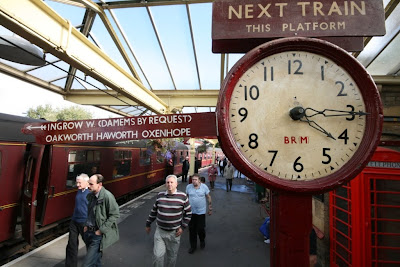

Tourists.
Britain was crossed by railway lines that carried trains to all corners of the land. Bridges were built across the valleys and people flocked to small towns to taste the delights of England's green rolling countryside. As branch-line railways were closed by modern governments desiring efficiency, many small communities lost their livelihood and were cut off from the flocking tourists.


This weekend we journeyed through small Yorkshire mill towns in search of Brontë country. We travelled on the local steam train to the village of Haworth, where The Railway Children movie was set. We stayed right in town at the Old Apothecary, opposite the church and parsonage where Patrick Brontë took his fledgling family to stay in this northern town.
The Victorian great literary giants of Austen, the Brontë sisters, Dickens and Hardy all critically described the harsh hypocrisies of Victorian morals and conventions. Social class distinction and protection of wealth through marriage led to situations that were unsustainable, and opportunities for women were limited in this patriachal society.


Our weekend involved taking an informative tour of Haworth and listening to the tragic story of the short lives of the Brontës: Charlotte, Emily, Anne and Branwell, who died young from diseases such as consumption. Father Patrick buried his wife and all children in a short span of time here in town.


We walked the 10km trail to Wuthering Heights, watched the movie of the same name, and also Jane Eyre. This was a treasured cultural event for us.
Virginia Woolf visited this town that has become a Mecca for Brontë followers. She wrote, "Haworth expresses the Brontës; the Brontës express Haworth; they fit like a snail to its shell."

A highly recommended place to visit. But watch out for the parking inspectors - they are notoriously ruthless.
No comments:
Post a Comment